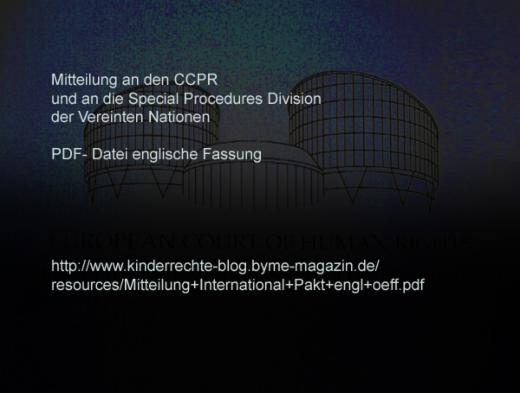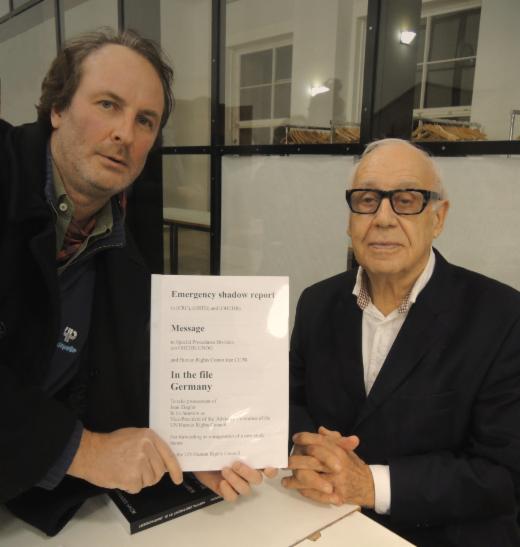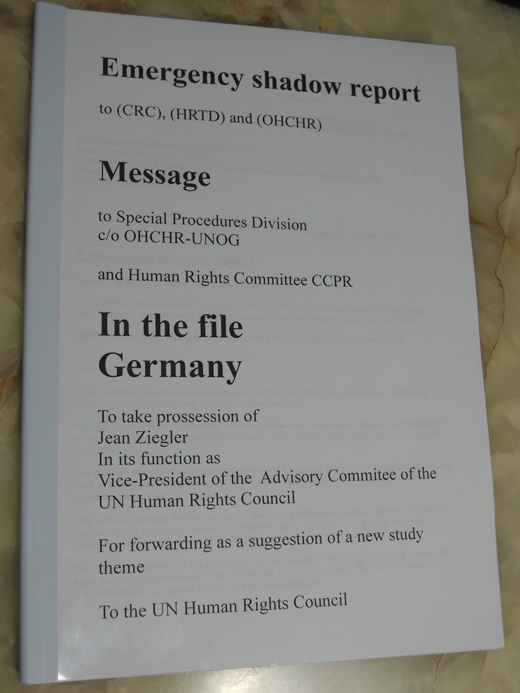
Als PDF-Datei
Notfall-Schattenbericht engl. Version: PDF-Datei
Special Procedures Division
c/o OHCHR-UNOG
8-14 Avenue de la Paix
1211 Geneva 10
Switzerland
Message
after this First Optional Protocol to the International Covenant on Civil and Political Rights
to the
Human Rights Committee (CCPR) Centre for Civil and Political Rights (CCPR Centre) • Rue de Varembé 1, PO Box 183, 1202 Geneva (Switzerland)
The suspicion of human rights crimes, violations of international law, genocide through euthanasia in living conditions
This act is accused of Federal Republic of Germany
Infringement of Article 6 (1) the right to life and Article 24 (1) of social protection
the International Covenant on Civil and Political Rights
Reason:
The complainant is one of 400,000 victims of the victim group from Germany, to whom the German state withholds rights under international law.
In general, the German state fails to legislate against the victim group. However, a legislative duty consists of the following UN resolutions, pacts and human rights decisions:
Article 39 of the Convention on the Rights of the Child Duty to create an environment for the recovery of dignity
UN-Resolution 60/147 Duty to create reparation mechanisms for social assistance, compensation and consequential damages
UN Resolution 53/144 Duty to promote human rights
UN Resolution 56/83 Duty to provide state liability
UN Millennium Declaration States must protect their citizens
International Pact for the Protection of Children and the Right to Education
Human Rights Court on the case of Luise O'Keeffe 35810/09 Duty to create satisfaction mechanisms
Article 2 of Human Rights Granting Free Development of Personality
These standards violate the German state. The victims are therefore in a legal vacuum. The victims can therefore not survive their involuntary inhuman life situation in the long run. They die unnaturally prematurely. Those who do not reach the average age because they deny human rights will be murdered.
However, the German state is responsible for the crime.
The original crime:
Child deprivation of liberty of minors under state custody. The victims were exploited by forced labor, humiliated and broken down by mental, physical and sexual violence, subjected to medication attempts or given unjustified compulsory adoption. All victims were deprived of education by these measures.
Although the acts in the institutions were caused by third party debt, these institutions were under state supervision. This duty of supervision was violated by the state. It was only because of this original crime of breach of duty that the subsequent crimes of exploitation and violence could arise.
The bigger crime, however, is to keep the victims living conditions in which they are unnaturally premature to death. The state does not comply with its obligation to protect, to compensate for the suffering by legislative action and to compensate for the consequential damage. The duty under international criminal law to assume responsibility for superiors does not comply with this murder or bring it to the public.
The victim group fulfilled all criteria that describe an armed conflict. The acts were underpinned with the use of armed force. The victims were constantly identifiable by special passes. Consequently, there is a suspicion of genocide-related crime.
In that regard, the complainant, as an informant, requested the International Criminal Court to start the prosecution. The request was received by the Court on 6 July 2017. Neither the entrance was confirmed nor communicated a file number. A declaration was presented to the UN Special Rapporteur Jean Ziegler in 2014, calling for individual complaints and encouraging the establishment of a Special Criminal Court. In 2015 and 2016, France was asked to request, as a substitute for the victim group in the UN Security Council, the adoption of a resolution to establish said special criminal court. The French presidential office promised to take over the then Foreign Minister Ayrault the matter, however, was no apparent action.
Since there is no domestic remedy for this type of claim, it is not reasonable for the complainant to exhaust legal remedies that are not appropriate.
The victim group calls for legislative action. An explicit minors' compensation law. The establishment of a Special Criminal Court, which identifies the number of victims, the form of the crime and those responsible for the debt legally binding.
The complainant assumes that the German State will seek to invoke the subsidiarity principle. The Roman Statute and international criminal law state that "a state is unwilling or unable to process its own crime ...". Applied in relation to the principle of subsidiarity, the Human Rights Council must also consider the state and will of a state to comply adequately with the human and international law standards in a "reasonable" window of opportunity for one of the victims.
The victim group has been fighting for compensation for 11 years now. The state of Germany participated in this period only in the minor social assistance, which is described in UN-Resolution 60/147. However, the legislator is not in the least concerned with providing the mechanisms for redress further listed in this resolution. A reasonable time frame has been exceeded and there can be no trace of adequate. Therefore, the German state can no longer rely on the subsidiarity principle.
A selection of evidence is attached. The complainant has further evidence, but in its fullness he has exceeded his capacity to be able to send it here. However, all evidence can be inspected at any time by UN staff.
The complainant now asks the committee to take action on the matter.
An acknowledgment of receipt is requested.
Sincerely Appendix: Evidence
Robby Basler Frankfurt, 04.02.2018

Committee on the Rights of the Child (CRC)
Human Rights Association (HRTD)
Office of the United Nations High Commissioner for Human Rights (OHCHR)
Palais Wilson - 52, rue des Pâquis
CH-1201 Genf (Schweiz)
Frankfurt, 06. Februar 2018
Emergency shadow report
because of a lack of human rights reporting
of the Report of the German Institute for Human Rights in the framework of Germany's third review in the Universal Periodic Review of the UN Human Rights Council 2018
and the report of the National Coalition on the implementation of children's rights
Dear Sir or Madam,
An emergency report on german state-report by self-defence is necessary, because a violation of international law is hidden within the state.
400 000 victims of instituionalized violence of the state have been abused and mistreated as underage persons and exploited through forced labour. They were withhold from right for education.
The german state is responsible fo the injury of its duty of supervison as against third party fault including government liability. The german state refuses to provide mechanism for reparation and recovery of dignity.
The victims informed the german government, the National Coalition and the Institute for Human Rights regarding missing proprietrary rights (obligations to protect from the resolution 60/147and article 39 of the Convention for the Rights of Children).
The free development of the personality of the victims is injured. State duty to protect and legal process does not exist. The victims live in a legal vacuum. The victims does not have a individual right of appeal in front of the United Nations.
If the victims stay under conditions which one can compare with conditions of euthanasia, they will die in average 30 years earlier as normal. When somebody does not reach the average age it means that he or she is killed.
The group of victims demands therefore the installation of a special court, which appoints legally binding the number of victims, the kind of crime und the persons in charge of guilt regarding international law. Such an installation is refused through German Government. and German Bundestag. ,
As the group of victims distrust the german Institute of Human Rights, which is installed yánd financed by the state, and the members of the National-Coaltion, which work for the church or in youth welfare, because many of the crimes happened in facilities of the church, and the problematic of victims was ignored in reports, the group of victims uses the instrument of Emergency shadow report.
The victims demand the immediate implementation of the norms of article 39 of the Convention on the Rights of the Child. The installation of an Victims Compensation Act for underage people, all other demmanded arrangements and mechanism for compensation for personal suffering to get reparation regarding the suffering and the adjustment of following damages. For legally binding rehabilitation the installment of a Special Criminal Court and for compliant in front of the United Nations, a Individual complaint , which is written in the 3. optional protocol to the Convention on the Rights of the Child .
Only through these mechanism the murder of the group of victims can have an end and the suspicion of of kind of genocid can be eliminated.
Its asked to hear the representation of the german state and to advice for the implemantation of the Human Rights.
The original German version of the complaint is attached.
Sincerely Appendix: Evidence
Robby Basler

